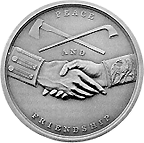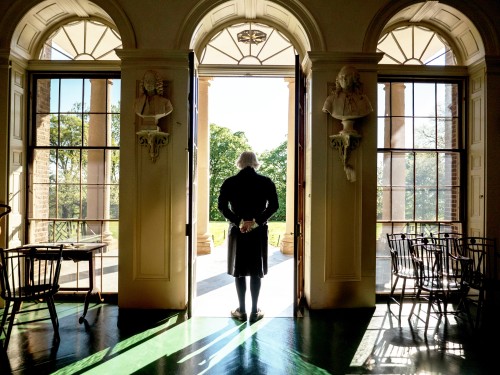 In every encounter Lewis and Clark had with Indian people, material goods played a significant role. Jefferson and Lewis recognized that large quantities of "Indian presents" were extremely important to the success of the mission. Indian and white relations on the American frontier were based on the mechanism of gift exchange, the idea being that the relationship would falter unless both sides demonstrated their commitment to alliance through the exchange of material goods. The presents that Lewis and Clark distributed and received along the trail were designed to symbolize the opening of relations between western tribes and the new American republic.
In every encounter Lewis and Clark had with Indian people, material goods played a significant role. Jefferson and Lewis recognized that large quantities of "Indian presents" were extremely important to the success of the mission. Indian and white relations on the American frontier were based on the mechanism of gift exchange, the idea being that the relationship would falter unless both sides demonstrated their commitment to alliance through the exchange of material goods. The presents that Lewis and Clark distributed and received along the trail were designed to symbolize the opening of relations between western tribes and the new American republic.
The gifts they received from the tribes they met provided members of the Corps with examples of Indian art and culture, but Lewis and Clark did not systematically "collect" Native American objects as they did plant and animal specimens. As important new research conducted by Dr. Castle McLaughlin at the Peabody Museum of Archaeology and Ethnology at Harvard University suggests, the Native American expedition objects that ended up in Jefferson's "Indian Hall" at Monticello and in Charles Willson Peale's museum in Philadelphia (the surviving examples from the Peale Museum are today in the Peabody Museum) should be understood as results of exchanges made in diplomatic and social contexts rather than as products of collecting in an anthropological sense. In this way, the objects represent the choices of their makers rather than those of explorers unfamiliar with the material culture of native people.
A letter Jefferson wrote to Lewis at the end of the expedition signals his understanding that the goods received by Lewis and Clark were diplomatic gifts, and not simply examples of the arts of Northern Plains Indians gathered by the explorers. When Lewis returned to the east in the last days of 1806, his party included Sheheke (Big White), a chief of the Mandan nation. As their route to Washington would take him through central Virginia, Jefferson wrote Lewis before their arrival in the capital, "Perhaps while in our neighborhood, it may be gratifying to him [Sheheke], & not otherwise to yourself to take a ride to Monticello and see in what manner I have arranged the tokens of friendship I have received from his country particularly as well as from other Indian friends: that I am in fact preparing a kind of Indian hall."
